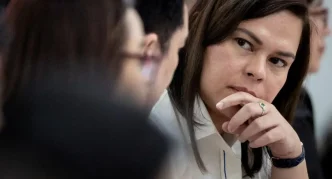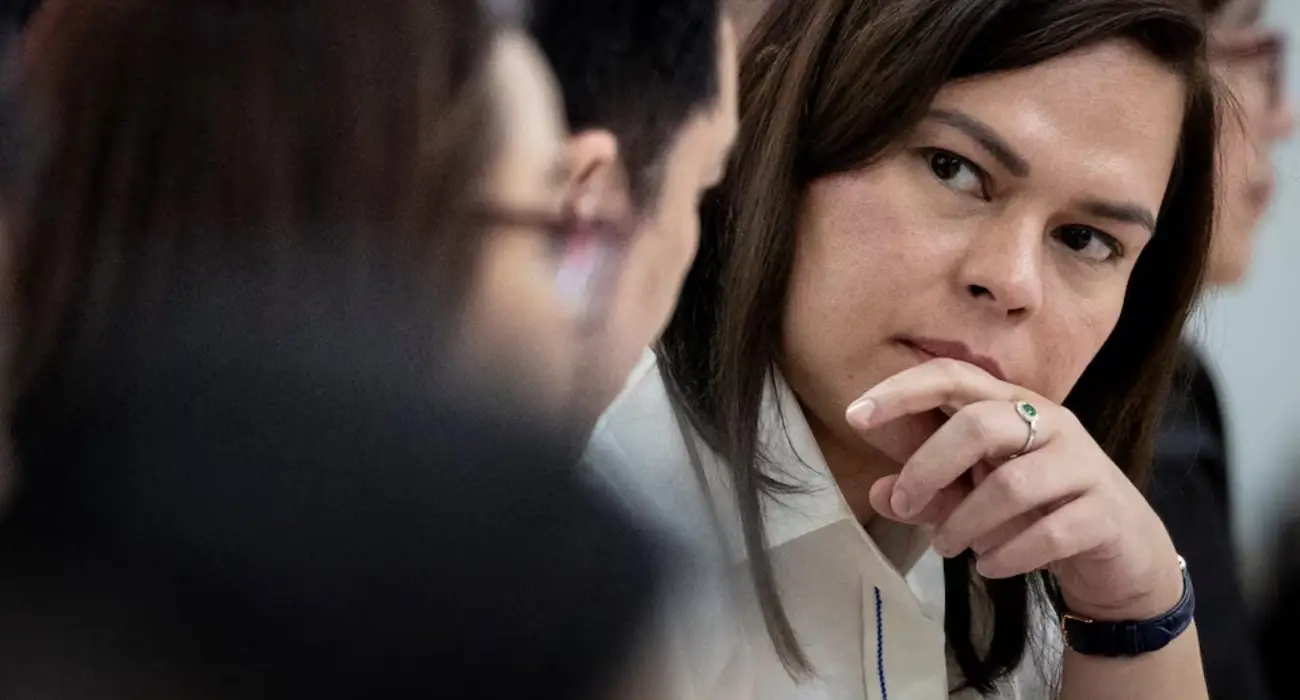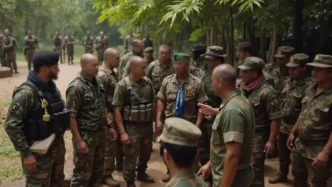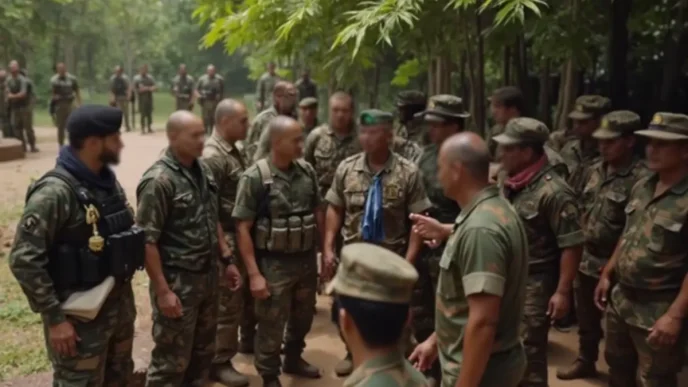The Philippines is witnessing a political drama of unprecedented scale as Vice President Sara Duterte faces a Senate impeachment trial, accused of grave offenses including misuse of public funds and threats against top government officials. On June 16, 2025, her formidable 16-member legal team, formally entered its appearance before the Senate impeachment court, signaling a fierce defense against charges that could redefine the nation’s political landscape. With 215 House lawmakers having filed seven articles of impeachment on February 5, 2025, the trial has ignited debates over accountability, political rivalries, and the enduring influence of the Duterte dynasty.
A Legal Powerhouse for a High-Stakes Battle
The Senate impeachment court, convened on June 10, 2025, received the formal entry of Duterte’s legal team at 5:03 p.m., as announced by spokesperson Reginald Tongol. “The Senate Impeachment Court through the Secretary of the Senate acting as Clerk of Court received the Appearance – Ad Cautelam from the law firm of Fortun Narvasa & Salazar to appear and act as counsel for Vice President Sara Z. Duterte” said Tongol. The document, submitted to the Senate, noted that the House of Representatives refused to accept a tendered copy at 3:42 p.m., marked as “Tender Copy refuse to receive,” highlighting procedural tensions between the chambers.
Duterte’s decision to assemble a 16-lawyer team, one of the largest in recent Philippine political history, underscores the gravity of the allegations and her determination to counter them. Speculation suggests that the size and expertise of her legal roster reflect a strategic effort to combat what her allies call a politically motivated campaign by President Ferdinand Marcos Jr.’s allies to derail her 2028 presidential ambitions. Duterte’s pick of lawyers are renowned for defending high-profile political figures, brings a wealth of experience in constitutional law, criminal defense, and public litigation, positioning Duterte to challenge the impeachment’s legal and procedural foundations.
The Legal Team: Expertise and Experience
Duterte’s defense team combines veteran attorneys with younger specialists, are known for handling complex political cases. The team’s composition suggests a multi-pronged strategy, likely targeting constitutional violations, evidentiary weaknesses, and public perception. Below is a detailed overview of the key members, their specialties, and estimated years of service.
| Name | Specialty Area of Law | Years of Service |
|---|---|---|
| Philip Sigfrid Fortun | Criminal Defense, Constitutional Law | 38 |
| Gregorio Narvasa II | Constitutional Law, Political Litigation | 32 |
| Sheila Sison | Civil Litigation, Administrative Law | 30 |
| Carlo Joaquin Narvasa | Corporate Law, Governance | 22 |
| Roberto Batungbacal | Criminal Defense, Human Rights Law | 27 |
| Justin Nicol Gular | Public Law, Election Law | 15 |
| Lindon Miguel Bacquel | Commercial Law, Litigation | 12 |
| David Ronell Golla VII | Constitutional Law, Appellate Advocacy | 10 |
| Maria Selena Golda Fortun | Criminal Defense, Family Law | 18 |
| Claraine Radoc | Administrative Law, Public Policy | 8 |
| Francesca Marie Flores | Human Rights Law, Litigation | 7 |
| Miguel Carlos Fernandez | Corporate Law, Compliance | 10 |
| Michael Wesley Poa | Election Law, Public Law | 9 |
| Reynold Munsayac | Criminal Defense, Civil Litigation | 15 |
| Mark Vinluan | Constitutional Law, Appellate Practice | 12 |
| Ralph Bodota | Public Law, Governance | 8 |
Disclaimer: The years of service listed for each attorney are estimates based on typical career trajectories for legal professionals, considering factors such as their roles, involvement in high-profile cases, and standard timelines for admission to the Philippine Bar. Exact Bar admission dates were not available from public sources, including news reports and the firm’s website, as of June 18, 2025. These estimates are provided for informational purposes and may not reflect precise years of practice. For accurate verification, contact the Philippine Bar Association directly.
Articles of Impeachment: A Broad Spectrum of Allegations
The House of Representatives’ impeachment complaint, endorsed by 215 lawmakers on February 5, 2025, levels seven articles against Duterte, accusing her of offenses ranging from financial misconduct to threats against national leaders. The charges reflect a deepening rift between Duterte and President Marcos’s administration, with whom she allied in the 2022 elections. Below is a summary of the articles, including the maximum potential penalties if convicted, styled to match the provided property table format.
| Article | Charge | Details | Maximum Term |
|---|---|---|---|
| Article I | Betrayal of Public Trust, High Crimes | Threats to assassinate President Ferdinand Marcos Jr., First Lady Liza Araneta-Marcos, and House Speaker Ferdinand Martin Romualdez | Removal from office, disqualification from public office |
| Article II | Betrayal of Public Trust, Graft and Corruption | Misuse of confidential funds in the Office of the Vice President and Department of Education | Removal, disqualification, up to 7 years imprisonment if criminally prosecuted |
| Article III | Betrayal of Public Trust, Bribery | Alleged bribery within the Department of Education during Duterte’s tenure | Removal, disqualification, up to 7 years imprisonment if criminally prosecuted |
| Article IV | Violation of 1987 Constitution, Betrayal of Public Trust | Unexplained wealth and failure to disclose assets in Statements of Assets, Liabilities, and Net Worth | Removal, disqualification, up to 5 years imprisonment if criminally prosecuted |
| Article V | High Crimes | Alleged involvement in extrajudicial killings during the drug war | Removal, disqualification, potential life imprisonment if criminally prosecuted |
| Article VI | Betrayal of Public Trust, Sedition, Insurrection | Alleged destabilization plots against the Marcos administration | Removal, disqualification, up to 7 years imprisonment for sedition if criminally prosecuted |
| Article VII | Betrayal of Public Trust | Unbecoming conduct as Vice President, including statements undermining government stability | Removal, disqualification |
Why Such a Large Legal Team?
The scale of Duterte’s 16-lawyer team has sparked speculation about her strategy. If confirmed, the size may reflect her camp’s belief that the impeachment is a politically driven effort by Marcos allies to neutralize her as a rival in the 2028 presidential race. As the daughter of former President Rodrigo Duterte, whose drug war defined his presidency, Sara commands a loyal base, particularly in Davao. Her legal team, led by Philip Sigfrid Fortun, a veteran of high-profile political cases, appears poised to challenge the impeachment’s constitutionality, particularly the filing of multiple complaints, which some argue violates Article XI, Section 3(5) of the 1987 Constitution, limiting impeachment attempts to one per year. Additionally, the team’s diverse expertise—spanning criminal defense, human rights, and election law—suggests a plan to contest the charges’ evidentiary basis while framing the trial as an attack on her family’s legacy, appealing to public sentiment.
Political and Procedural Context
The impeachment stems from a fractured alliance between the Duterte and Marcos dynasties, once united in the 2022 elections. Duterte’s alleged threats against Marcos, his wife, and Romualdez, made public on November 23, 2024, intensified tensions. “I have contracted an assassin to kill Marcos, his wife, and Romualdez if I were killed” said Duterte, a statement she later clarified was not a jest, fueling charges of high crimes. The House’s complaint also cites misuse of confidential funds, with reports alleging 125 million Philippine Pesos (~US$2.2 million, based on June 18, 2025 exchange rates from XE.com) misallocated in the Office of the Vice President and Department of Education.
Procedurally, the trial faced hurdles. On June 10, 2025, 18 senator-judges, led by Senator Alan Peter Cayetano, voted to remand the articles to the House, questioning their compliance with the one-year impeachment bar and the 20th Congress’s jurisdiction. The House’s refusal to accept Duterte’s legal team’s document underscores ongoing legislative friction.
Public Divide and Future Implications
The trial has polarized the Philippines. In Davao, Duterte’s supporters rally against what they call a “political vendetta,” with one protester stating, “Sara is being targeted because she’s a threat to Marcos’s power.” In Manila, critics demand accountability, particularly for alleged extrajudicial killings linked to her father’s drug war, which some claim she tacitly endorsed. “This trial is about justice for those killed in the drug war” said a Manila-based activist, reflecting calls for scrutiny amid ongoing International Criminal Court investigations.
As the Senate awaits Duterte’s response to the June 11, 2025 writ of summons, the trial’s outcome remains uncertain. If convicted, Duterte could face removal from office and disqualification from future elections, reshaping the 2028 race. If acquitted, she may emerge stronger, galvanizing her base. Either way, the proceedings test the Philippines’ democratic institutions, raising questions about how a nation reconciles its turbulent past with its aspirations for accountable governance.
















